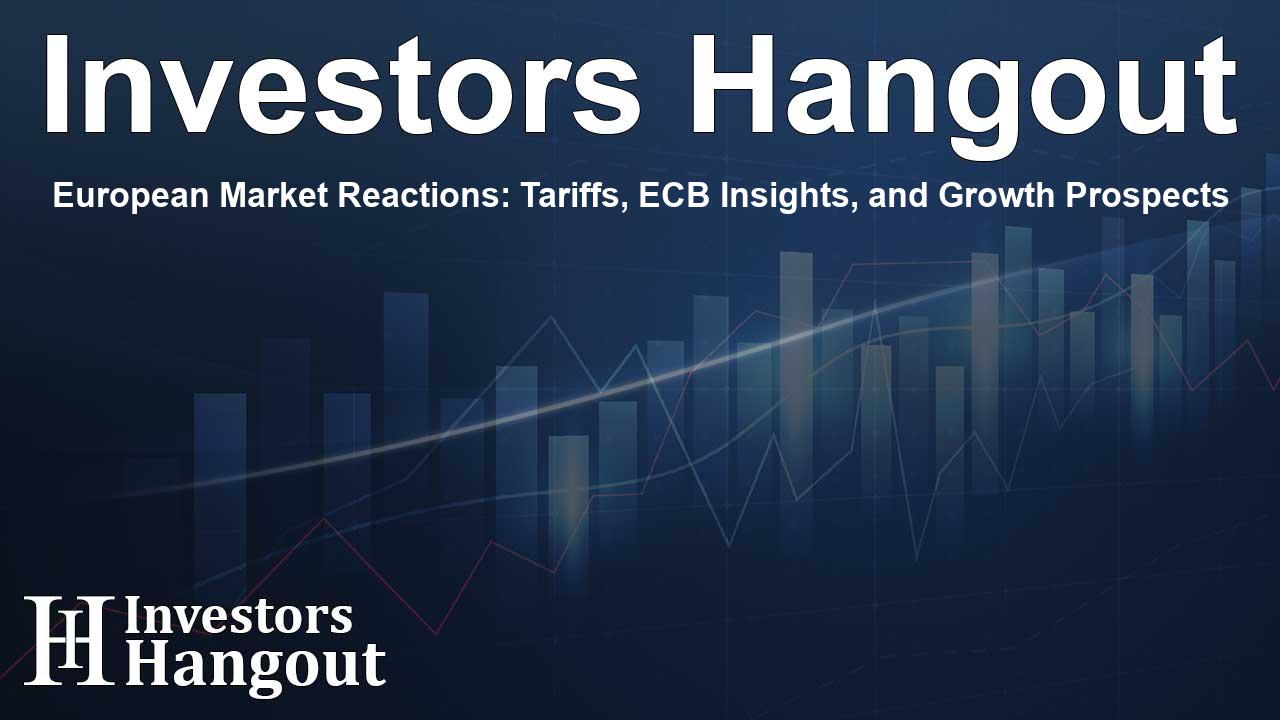European Market Reactions: Tariffs, ECB Insights, and Growth Prospects

European Markets React to Global Tariff Concerns
European markets have opened the day lower, with a palpable tension among investors regarding the possible global effects of proposed tariff measures from the U.S. These tariffs include a significant 10% on Chinese imports and a hefty 25% on goods from neighboring Mexico and Canada. Such measures have ignited concerns about disrupted trade flows and potential inflation, causing a ripple effect across the Atlantic.
As of the latest update, Germany's DAX has seen a decline of 0.6%, France's CAC 40 dropped by 0.8%, and the UK's FTSE 100 was off by 0.4%. The markets are reflecting growing apprehension in light of these developments.
Economists are cautioning that the potential inflationary impact of these tariffs could lead to a more gradual approach from the Federal Reserve regarding interest rate cuts. A shift in the Federal Reserve’s strategy could strengthen the U.S. dollar against currencies like the euro and the British pound, complicating the wider economic scenario.
Key Focus: ECB Strategies and Regional Economic Insights
The attention now turns to the European Central Bank (ECB) and the economic indicators across the region. For instance, Bank of England Chief Economist Huw Pill is expected to provide insights during his testimony before the House of Lords, which could reveal the bank’s strategies for tackling ongoing inflation while stimulating growth.
Meanwhile, ECB board member Elizabeth McCaul is set to address an audience in Frankfurt, complimented by peer Mario Centeno, who will present the latest financial stability report from the Bank of Portugal. These discussions are critical as they will throw light on the ECB's plan to manage high inflation rates and the uneven recovery within the Eurozone.
In addition, Riksbank Deputy Governor Anna Seim is scheduled to speak in Stockholm regarding Sweden's monetary policy, while the Bank of Finland's Governor Olli Rehn will address parliament on Finland's economic outlook within the broader European context.
H&M's Struggles Versus Next's Growth Trajectory
In the retail sector, H&M (ST:HMb) has faced a downgrade from analysts at RBC Capital Markets to a 'sector perform' rating. This decision stems from a discernible slowdown in its recovery process alongside stiff competitive challenges that are hampering its earnings growth potential.
On a brighter note, Next plc (LON:NXT) has been upgraded to 'outperform' status by RBC, citing robust sales growth, judicious cost management, and promising international expansion plans. Analysts are optimistic, projecting around 25% upside for the stock, which presents a stark contrast to H&M's current struggles.
Geopolitical Signals and Oil Price Movements
In the commodities market, crude oil prices have recorded a slight increase, bolstered by a perceived easing of geopolitical strains in the Middle East, alleviating immediate concerns over supply interruptions. Presently, Brent crude is priced at $72.69 per barrel, marking a 0.3% rise, while WTI crude also gained 0.3% to reach $69.12 per barrel.
Despite this bright spot, energy prices continue to be supported by uncertainty surrounding regional stability as tensions between Russia and Ukraine escalate. Investors remain watchful as these dynamics unfold.
Frequently Asked Questions
What are the key factors affecting European stock markets currently?
The primary factors include the proposed U.S. tariffs on imports, inflation concerns, and the potential responses from the Federal Reserve.
How is the European Central Bank responding to economic challenges?
The ECB is actively discussing strategies to manage high inflation and support recovery through remarks from board officials and economic reports.
What is the outlook for H&M and Next in the retail market?
H&M faces downgrade challenges due to a slow recovery, while Next is showing positive growth prospects and has received a favorable rating upgrade.
How are oil prices affected by geopolitical events?
Oil prices have fluctuated amid easing tensions in the Middle East, although concerns over stability in the region continue to support prices.
What role does the Bank of England play in the current economic landscape?
The Bank of England, through its chief economist's insights, provides direction on managing inflation and supporting economic growth in the UK.
About Investors Hangout
Investors Hangout is a leading online stock forum for financial discussion and learning, offering a wide range of free tools and resources. It draws in traders of all levels, who exchange market knowledge, investigate trading tactics, and keep an eye on industry developments in real time. Featuring financial articles, stock message boards, quotes, charts, company profiles, and live news updates. Through cooperative learning and a wealth of informational resources, it helps users from novices creating their first portfolios to experts honing their techniques. Join Investors Hangout today: https://investorshangout.com/
Disclaimer: The content of this article is solely for general informational purposes only; it does not represent legal, financial, or investment advice. Investors Hangout does not offer financial advice; the author is not a licensed financial advisor. Consult a qualified advisor before making any financial or investment decisions based on this article. The author's interpretation of publicly available data shapes the opinions presented here; as a result, they should not be taken as advice to purchase, sell, or hold any securities mentioned or any other investments. The author does not guarantee the accuracy, completeness, or timeliness of any material, providing it "as is." Information and market conditions may change; past performance is not indicative of future outcomes. If any of the material offered here is inaccurate, please contact us for corrections.